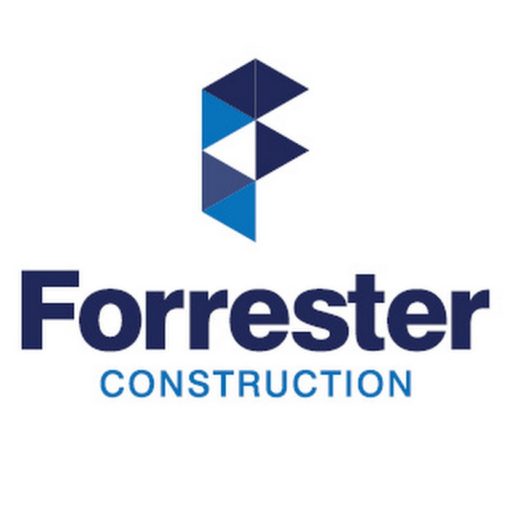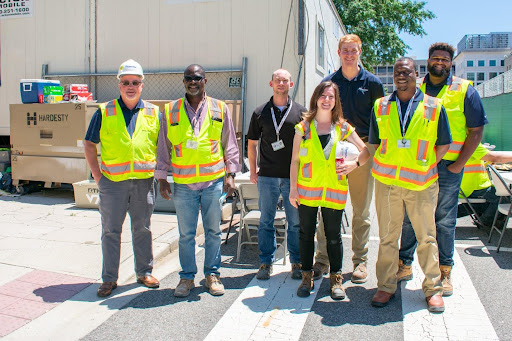Looking to enter commercial construction? Then you need to know the career roles for construction professionals. The construction industry continues to grow and expand as more communities explore how to bring in more visitors, patrons, and permanent residents.
Building new schools, churches, theatres, and healthcare facilities not only supports the health and well-being of these communities but also helps to build culture and create peace of mind among community members. Constructing or renovating embassies, public buildings, museums, parks, and more can bring awareness to communities, attracting new audiences and diverse groups of people. This increased engagement can provide much-needed income to support these growing communities.
The need for expansion, creation, and vital community resources increases the demand for construction. This results in the construction industry having a variety of careers that are vital to construction’s long-term success. For those who are considering entering the construction industry, the following career roles provide opportunities for stable and lucrative jobs, while also expanding one’s professional skills.

What Are The Career Roles for Construction Professionals?
Project Engineer
When working for a general contractor, like Forrester Construction, a field engineer is an entry-level position in operations. Our project engineers get a well-rounded experience and develop a foundation of construction knowledge, learning the ins and outs of what our project managers, superintendents, estimating, and preconstruction teams do.
This experience allows them to explore which career path best fits their personality and skillset. Once a project engineer has gained the experience necessary to grow and move up in their career, they are promoted to either an assistant project manager or an assistant superintendent.
Project Manager
A project manager is a career in construction that is crucial to a project’s success. A project manager oversees a construction project from start to finish and helps ensure that it remains on track. Project managers are directly responsible for managing client relationships and members of project teams, resulting in work that is completed on time, and profitably.
Project managers are vital in communicating with the client about the status of their project and communicating with architects about any constructability, material, or contractual issues. Project managers take the lead in the overall financial management of projects, while also helping to coordinate safety, schedule, and contracts. This is achieved by supervising important aspects like site inspection, budget maintenance, payments, and project coordination.
Those who have previously worked within a business/project management role generally have skills that can be effectively transferred to the construction industry, even without a construction background. A project manager is kept informed on all important updates, setbacks, or issues that may come up during the project, and collaborates with the team, client, and architect on how to mitigate any potential delays or financial setbacks.
Superintendent 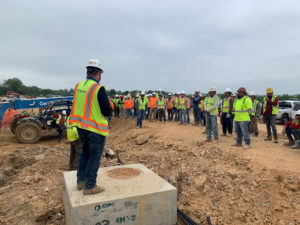
Superintendents in construction are directly responsible for the setup and management of the daily activities of assigned projects. A superintendent for general contractors is responsible for:
- Overall safety
- Schedule management
- Field operations
- Subcontractor management
- Assist in estimating
- Purchasing when needed
Superintendents have great problem-solving skills and can build and manage relationships effectively. Many looking to enter the superintendent career path are skilled at:
- Setting and meeting deadlines
- Tracking progress
- Giving meaningful feedback
- Working under pressure
- Being able to manage and/or coordinate many tasks at once
Construction or Project Executive
Construction executives and project executives are the leaders of construction teams and companies. With a breadth of experience in the project management or superintendent track, executives are promoted from senior project managers and senior superintendents.
These executives help business development in finding and winning work, develop and support target markets, support and make final decisions for construction projects, and are extremely well versed in project financials. In short, construction executives and project executives are responsible for the overall construction function of a company.
Support Roles Are Also Common Career Roles for Construction Professionals
There are many roles within a general contractor and subcontractor company that are crucial to the success of a project. Information services provide Forrester’s teams the devices, applications, and training they need to stay on track with the latest helpful technology and keep their projects streamlined and safe. The business development professionals connect, build and maintain relationships with the clients, owners, owner’s representatives and architects that give us work.
Financial services professionals manage project invoices, make sure subcontractors are paid on time, create earnings projections, and more. There are many other positions available within the construction industry to support our team members in the field including:
- Marketing
- Recruiting
- Human resources
- Estimating
- Preconstruction
- And more!
Even if you don’t have an engineering background, you can do your part to help build meaningful and impactful buildings within the Washington D.C. Metropolitan area.
Subcontractor Trades 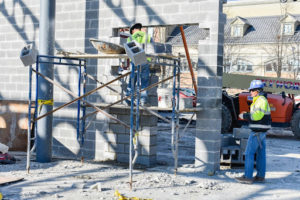
Without a great team of subcontractor partners, general contractors would not be able to build or bring the vision of the owner and architect to life. There are many trades necessary to complete commercial construction projects of all scopes and sizes.
Some of the primary trades vital to most construction projects include:
- Site Development
- Framing
- Roofing
- Siding
- Concrete
- Structural Steel
- Plumbing
- Heating
- Air Conditioning
- Electrical
- Carpentry and Flooring
- Specialty Subcontractors (Example: Pool or Ice Rink Installation)
- Many more!
Construction Laborer
Construction laborers are important as they are responsible for performing the physical labor necessary to complete projects. Known as one of the fastest-growing careers, construction laborers can often enter the field without previous experience, and have the potential for growth, career development, and higher pay. Construction companies, including both general contractors and subcontractors, cannot succeed without construction laborers.
Construction laborers’ roles include tasks such as:
- Moving important materials to a job site
- Loading and unloading materials
- Completing necessary steps like digging or assembling
- Cleaning and preparing job sites
- Providing support for trade workers who need it during a project
Construction Equipment Operator
Another crucial role within the construction industry is the construction equipment operator. They are responsible for running critical construction equipment and helping to ensure that these jobs are done safely and on time. Construction equipment operators handle a variety of equipment including road graders, bulldozers, trench excavators, and more.
Due to the complexity and potential danger associated with using heavy machinery, these operators will be required to complete extensive training, and often receive specialty licenses, before entering the field. This training ensures that they know how to operate the equipment, and all of the safety protocols in place to prevent workplace accidents. Common work associated with construction equipment operation includes:
- Excavation
- Extraction
- Digging
- Demolition
- Hauling
- Moving supplies or heavy materials
Civil Engineer
An important career that is commonly seen in construction is a civil engineer. They use their education and experience to help put together a project and its plan and help oversee the project’s completion. Civil engineers can help ensure that a project’s foundation is stable and safe and determine solutions for any technical problems that may arise.
While they are not involved in the actual construction portion, their insight throughout the duration of a project is necessary for a successful project. There are different specialized areas of civil engineering including structural engineering, environmental engineering, and more. These specialized areas of civil engineering focus on specific topics and project goals.
People who enter a specialized area of civil engineering generally have a comprehensive knowledge of that particular topic and are extremely valuable in projects, particularly with unique or complex scopes of work.
Architect
Whether renovating, expanding, or building a new facility, an architect is necessary for the first steps in planning and designing a construction project. Creating a concept drawing and initial plan is a huge part of turning a vision into a reality. A client’s new and/or improved building is a huge investment that will not only impact them financially but will impact the employees, patrons, and overall community once it is complete.
The architect provides a detailed roadmap via drawings and specifications documents to define the facility, building, or outdoor space from the exterior to the interior finishes and more. Having a knowledgeable, experienced architect can ensure that when construction is underway there are fewer constructability issues, change orders, and in turn, delays. Early involvement from architects can also be helpful for productivity and efficiency by providing opportunities for project site advice, zoning approvals, and more.
Like a civil engineer, architects are often not involved in the day-to-day activities once construction is ongoing; however, they work closely with the general contractor and client to answer any questions about designs, collaborate to solve problems, and create a smooth construction project.
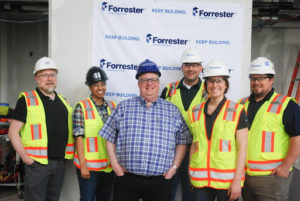
Conclusion
Interested in a career in construction (particularly being a project manager, superintendent, or entry-level operations?) Check out our Forrester Construction’s positions!
Looking to learn more about the construction industry? Read more of our blogs!
